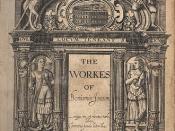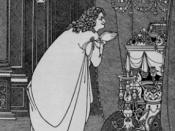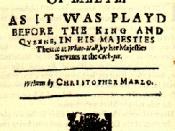Christopher MarloweÃÂs The Jew of Malta, written around 1590, shares many interesting similarities with Ben JonsonÃÂs 1605 play Volpone. Both works follow a similar narrative structure and also share common themes and character types. Greed as a character trait is very important in the plot of both plays, as are wit, deception, and questionable or absent morality In fact, JonsonÃÂs character Volpone is named from the Italian word for ÃÂfox,ÃÂ telling us right away that cunning and slyness are his defining characteristics. Both of the plays focus on a main character who uses his intelligence and ability to deceive as a way to satisfy his greed. It is in the main characters of the plays (Volpone and Barabas) that we see the greatest similarity between the two works. The similarities, as well as slight differences between these two characters and plays, show us some of the dividing and defining characteristics of the playwrights themselves.
Both Barabas and Volpone are driven to their questionable moral decisions In these two characters, we see men who possess an uncanny ability to deceive nearly everyone they come into contact with. They lie and make false promises to many different people, and are able to keep their webs of deceit intact when one mistake, or one person learning the truth, would completely destroy their intricate plans. This is perhaps best evidenced by Volpone, who is able to keep four different people convinced that they will become heir to his fortune, while collecting gifts and wealth from each of them throughout. His scheming involves feigning serious illness, disguises, convincing rhetoric, and a very helpful servant in Mosca. If any one of the four ÃÂbirds of preyÃÂ who want his fortune were to find out the truth, Volpone would lose everything. In The Jew of Malta, Barabas is a rich Jewish merchant who has his assets seized by the government. He is enraged by this, and plans to regain his wealth and exact revenge on the Governor Firneze. He also utilizes disguise, lies and false promises to everybody involved, and likewise enlists the help of others (his daughter Abigail and his slave Ithamore), but ends up killing both of them in the continuation of his scheme.
As Volpone and The Jew of Malta draw to a close, the similarity of the plots continues as both characters attain what they desired. Barabas regains his wealth and becomes governor of Malta after helping the Turkish Army conquer the island, replacing his enemy Firneze in the process. Volpone escapes downfall after an amazing deception of the Venetian courts by his servant Mosca, and is able to continue bleeding wealth out of his four dupes. However, the elaborate schemes of both characters ultimately fail, because they take their plans too far. Ignoring MoscaÃÂs advice that they should rest after their close call, Volpone continues the deception by feigning death and naming his servant the heir allowing him to fully humiliate his dupes. In doing this however, VolponeÃÂs power and wealth is usurped by the even more cunning Mosca. Volpone is on the verge of losing everything, and the only way to regain control is to confess in front of the court, which results in his life imprisonment. Barabas, instead of being content when named Governor of Malta, strikes a deal with his enemy Firneze to take part in a scheme to kill Calymath, the Turkish leader who he had just aided to victory. Firneze plays along, but deceives Barabas in the end and causes him to fall into the deadly trap planned for Calymath. In both plays, the charactersÃÂ greed drives them to create intricate and successful schemes, but also becomes their downfall as they cannot be content with their gains when the scheme reaches the breaking point.
The sympathy of the audience toward these two characters is very similar as well. In both plays, the main character is initially supported by the audience. In the early stages of The Jew of Malta, we feel that Barabas has truly been wronged by the government, and we support his desire for the reclamation of his wealth and his plans for revenge. Also, he seems to us, one of the only honest characters in the play. He lies to other characters, but he is quite up-front and honest in explaining his motives to the audience, while we see rampant hypocrisy from the characters he is plotting against. In Volpone, we understand that the character is acting solely out of greed, with no higher motives. However, we delight in the intricacy and improbability of his ruse. We look past the questionable morality of his duping four other characters into giving him their possessions; in fact we support it because the other characters are obsessed with their greed understand that they are being taken advantage of. However, our sympathy leaves these characters when their actions become too distasteful to look past. Volpone attempts to rape CeliaÃÂone of the only innocent characters in the playÃÂand subsequently has her put in jail after deceiving the court. With Barabas, the honesty he shows the audience cannot counterweigh the increasing death-toll he causes. He also kills an innocent character: his daughter Abigail. Along with this truly horrible act, we see him: convince two young men to kill each other, poison all the nuns in a convent, kill a priest and lay the blame on another, kill his servant along with two others, and plot a final scheme in which he will kill the Turkish commander and all of his soldiers. By the fourth act in each play, we want these characters to fail, even though we had supported them earlier.
Even with all of these close similarities, there are differences to be seen between the two main characters. The first of these lies in the ambition and purpose that lies behind their schemes. In Volpone, we see the main characterÃÂs aim when he discusses his gold in the opening lines. ÃÂYet, I glory / More in the cunning purchase of my wealth / Than in the glad possessionÃÂ (I.i.30-32). From the beginning, we see that Volpone finds value only in his ability to deceive and take advantage of people, not in the calculable results of that deception. This attitude of VolponeÃÂs is unchanging throughout the play. For Barabas however, he begins the play seemingly content with the wealth he has, although he is certainly greedy to get more. His happiness lies in the possession of wealth. After his estate is taken from the government, he has a natural desire for reclamation and revenge against those who wronged him. We see a shift however, as his determination begins to come less from greed and more from intense hatred toward everyone around him. As a Jew in Malta, he is viewed as an alien; he is disgusted by the hypocrisy of the Christians who outcast him, and kills his daughter for converting. His pleasure regarding the murders he commits or causes indicates that his sole aim is vengeance. Some of these excessive murders have little apparent motive. His aim of reclaiming his wealth and exacting revenge on those who took it gets swallowed up by a ÃÂme against the world attitude.ÃÂ By the end of the play, it seems that his hatred and feelings of exile from the community cause him to want to kill everybody. This can be seen in his last lines in the play, while he is dying in his own trap, ÃÂI would have brought confusion on you all, / Damned Christian dogs, and Turkish infidels! (V.v.84-85). Volpone does not develop this universality to his deception because he belongs to the upper class of his society. His aim is only to take advantage of a couple of targets who are easily taken advantage of.
Another major difference that can be seen between the characters is the theatricality with which Volpone directs his scheming. He manipulates the other characters as if he was a puppet-master, and controlled everybody around him with strings. This relates to the value he finds in the ÃÂcunning purchaseÃÂ of wealth. While Barabas is content to kill anybody who stands in his way, it seems that Volpone would view that action as an undesirably simple, thuggish solution. Mosca alludes to VolponeÃÂs deception as his ÃÂsport.ÃÂ He would find no sport in murder, unless it involved an incredibly detailed scheme to succeed. His perception of power comes from seeing himself manipulate the ideas and actions of others to fulfill his desires, not in eliminating the others to ease his own fulfillment of desire.
I think that the similarities and differences visible between these two characters illuminate some of the differences between the aims of Christopher Marlowe and Ben Jonson. Marlowe was much more willing to show disruption of the social order, as well as the shedding of societyÃÂs moral codes. This is evidenced by the rise of Barabas, an outcast of society, to claim the title of governor after causing the deaths of over a dozen people. Marlowe believed the world to be very unpredictable, and believed in the power of the individual to make great change. However, I think he also placed importance on the individualÃÂs use of intelligence to control themselves and the situations they are put in. This is why Barabas fails in the end of the play. Marlowe will give the freedom of success to a character such as Tamburlaine, who commit his horrible deeds in the situation of war, and always made his decisions in light of that situation. Barabas however, loses his self-control. When he stayed true to his rightful, natural desires for reclamation of his wealth and revenge, he succeeds. It is when he overreaches and tries to take on the whole world that he falls victim to being outsmarted by someone he was plotting against.
Ben Jonson, on the other hand, was very concerned with keeping the social order. Marlowe viewed the rules and ethics of society as artificial bondage against freedom, Jonson saw societal institutions as rightfully keeping things the way they should be. This is evidenced in Volpone. The main character fails because he exhibits insatiable greed. He cannot be content with all that he has gained, and pushes the scheme too far, which will invariably, and rightfully, cause failure within the constraints of society. Mosca is clearly the more cunning of the two schemers, and it looks as though he will come out on top. However, it seems that Jonson is unwilling to allow for a servant to become a member of the elite class. I think that Marlowe would have applauded MoscaÃÂs use of his intelligence and wit, and would have allowed him to keep his wealth. Instead, Jonson depicts the social order remaining upheld; Mosca is discovered and sentenced to life imprisonment. Jonson makes the point that uncontrolled greed will invariably end in failure, regardless of the intelligence that accompanies it.
Works CitedJonson, Ben. Five Plays. New York: Oxford UP, Incorporated, 1999.
Marlowe, Christopher. The Complete Plays. New York: Penguin Classics, 2003.





